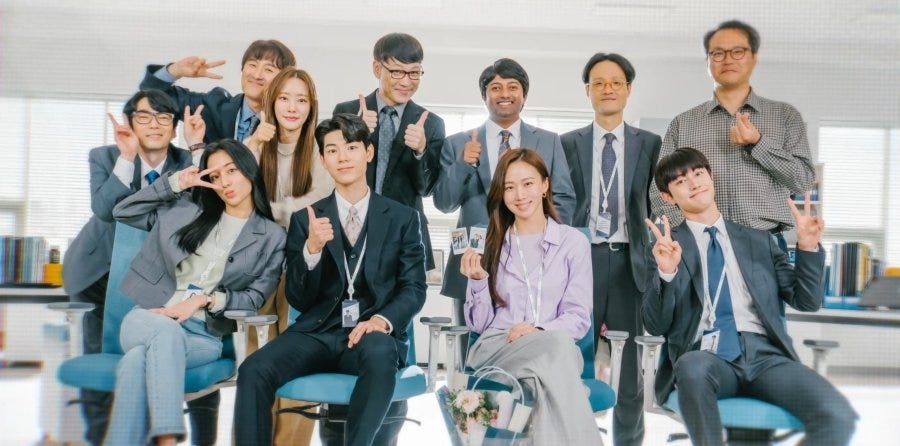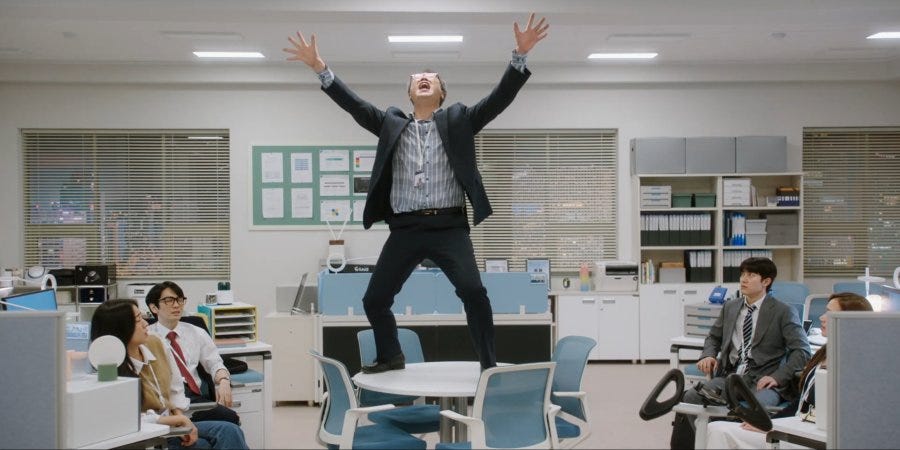Gaus Electronics (2022) Connections
This post contains spoilers for the finale.
Gaus Electronics, belying its non-descript name, is a fascinating (and effective) satire about workplace dynamics and a fickle global economy tethered to technology. Despite the setting romance is unsurprisingly a large part of it because in the absence of community elsewhere, individuals are increasingly being positioned to seek out long-term relationships in their workplace. By nature of hours spent there the workforce also provides the pool for de facto families as individuals become isolated from birth ones. Large organizations like the state and corporations are the main beneficiaries of this shift in social structure. In fact these entities get to call the shots. They delineate working conditions. They determine the cost of living. As a result they dictate the size of households. They define education. And they also create a platform where romance can be conducted while some business is done on the side. In effect they turn individuals into single unit economic agents. Corporations are the all-consuming social engineers of our time — all in the name of economic prosperity, stability and security. In this so-called postmodern age they have become the standard bearers of conformity and are enforcers of it. Corporations’ impact on family and community are at best, mixed because the endgame is consumerism. With all of this as its backdrop, Gaus Electronics gets plenty of mileage to play in its sandbox.
The two main male characters, Sang-sik and Ma-tan are purposely positioned as idealistic but comical figures. They serve as obvious contrasts to their more savvy, cynical and even jaded colleagues who know and grudgingly accept that being on the loser team is better than being on no team at all because ultimately they are beholden to a larger system that has little time for individual agency. In our introduction of him Sang-sik has made the biggest blunder of them all. He’s made a video… an unflattering one at that… about the company and its gone viral. Ma-tan, the latest recruit and heir to rival Power Inc., has a desperate need to prove himself. So he naively chooses Team 3 to do his “internship” because he’s tired of things being handed to him on a silver platter. When he arrives he gets more than he bargains for. His sense of proportionality is questioned. In other words, he is deconstructed stereotype on a hero’s journey.
Ma-tan is in essence a chaebol heir, normally the K drama equivalent of Cinderella’s prince. He is a prince who condescends to be a commoner in what he thinks will be a temporary gig to earn his street creds when he becomes king. But at the end not only does he not take up his “rightful” place in Power Inc next to his father, his only promotion within the context of the show comes from an unearned seniority. Despite all his efforts in wooing the object of his affections, she rejects him… although there’s a hint at the end that a change of heart is in the process of occurring. Much of the humour he brings to the table revolves around his relationship with the team manager (Baek Hyun-jin) who takes on the mantle of father-mentor figure. What’s hilarious about their dynamic is that it’s built on mistaken identity which suits Ma-tan’s agenda to some degree but also begins to wrought change in him. Ma-tan’s deprivations are not founded on poverty but on having lived all of his life in the chaebol bubble. His experience of life is narrow and restricted to his milieu (and mother’s over attentiveness). To his middle class colleagues he is perceived as a pathetic creature because he has never had drinks from a vending machine or enough small change to do so.
Sang-sik is the every man in hyperbole. He doesn’t fit easily into the conventional male lead role. At times he comes across as not being very bright. He’s generally a bit slow on the uptake but there are moments he proves that he’s not as dim-witted as he appears. His persistence is his strength. He is an idealist in the extreme and his relationship with Na-rae contributes to his growth especially when hostilities between come to an abrupt end. His honesty and naivete rather than being a thorn in her side becomes the appeal. He likes her and he’s rather too eager to show it, sometimes hilariously to his detriment. It turns out that Na-rae genuinely likes him too. But when he discovers that she’s been trying to cover up for his inadequacies, he feels that he hasn’t been able to live up to her expectations. Still it isn’t what she thinks. It isn’t that he objects to being refashioned to suit her but is bogged down by the disappointed realisation that he has failed to be worthy of her. On the other hand her intentions aren’t intentionally malicious. She does want him to be more respected by their colleagues.
At the end of the day, the most pivotal character in the show…. the one that reiterates the show’s intentions is the mostly invisible Na Moo-yeong literally meaning anonymous (or nameless perhaps). For much of the show he’s in the background observing, recording and being privy to the most intimate moments. I for one did notice him from the start wondering what his role in the show was meant to be. That becomes evident closer to the end. He is the quintessential Invisible Man. In a large corporate entity like Gaus, it is easy to get lost in the monolith of conformity especially when one’s colleagues stand out for good or ill. It just so happens I’ve just been watching Star Trek Picard. Picard’s old enemy The Borg are best remembered for the iconic lines: “Resistance is futile. You will be assimilated.” The Borg are drawn after hive creatures likes bees and ants. They convert their captives into members of “the collective”. It’s no stretch to see the parallels here with corporations and their hundreds of nameless employees who clock in day in day out that contribute to the company’s success with no public recognition for their efforts. They are seldom in the spotlight and are mere cogs in the larger machinery. It is fitting that Na Moo-yeong gets to shine in the finale not only because he’s been like the audience there capturing those crucial moments but it’s a celebration of the ordinary worker that gets the job done when everyone else is busy playing office politics or romancing their colleague. He is the one that advises Sang-sik that to be acknowledged by one person is often enough to make the world a slightly better place for you. One person that sincerely likes you for who you are.
Gaus Electronics at the end of the day is about making connections which is at the heart of our humanity. No matter how conformist the culture is, we resist and long to be individuals. And be part of families. Aziz, Sang-sik’s flatmate positioned as the other outsider is often the voice of reason bringing the characters back down to earth. He is presented as the reliable observer because he is the foreigner who looks in and chuckles at the oddities but develops a genuine fondness for the people he’s come to know. In the end, he becomes part of the Marketing Team 3 family as the latest recruit.
If you enjoyed this post please click on the “Like” button.




